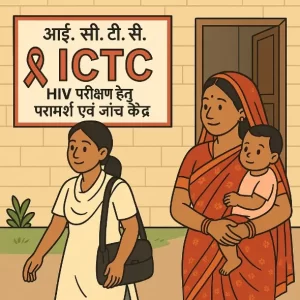The Unsung Heroes of HIV Care: Outreach Workers under the Vihaan Programme
In the quiet corners of India’s cities and villages, there are everyday heroes whose names may never appear in newspapers, but whose impact is immensely felt in the lives they touch. These are the Outreach Workers (ORWs) of the Vihaan Programme—warriors who walk beside people living with HIV (PLHIV), not ahead of them, not behind, but step by step.
They are the heart and soul of the Vihaan Care and Support Programme, which was launched by the Alliance India (India HIV/AIDS Alliance) in collaboration with the National AIDS Control Organisation and has provided care and support services for approximately 15 lakh people living with HIV and their families. But more than a programme, Vihaan is a promise—a promise that no one should have to face the struggles of living/affected with HIV and Outreach Workers are the ones who keep that promise alive every single day.
More Than a Job
For many Outreach Workers, this is not just a job. It’s related to their own struggles. Many are living with HIV themselves. Some have lost loved ones to the virus. All of them have chosen this path because they believe in something bigger—the power of empathy, of community, and of standing up for others.
Their days are long and often unpredictable. They might start the morning by helping a newly diagnosed young person accept their HIV status and understand what ART medicine (antiretroviral therapy) is and why it matters. In the afternoon, they could be accompanying a mother living/affected with HIV to the hospital, helping her navigate a system that feels overwhelming. By evening, they may be visiting a family who has stopped treatment out of fear, shame, or simply the crushing weight of daily survival.

Through it all, Outreach Workers do more than connect people to services—they listen, comfort, encourage, and stand as reminders that healing isn’t just medical—it’s also emotional and social. In doing so, the ORWs also pave a path of hope, empowering the weaker section and creating a responsible and healthy individual who can contribute meaningfully to society.
The Difference They Make
It’s because of these Outreach Workers that:
“A man who once gave up on HIV treatment is now healthy and working again”.
“A teenager found the courage to continue in school after learning about her HIV status”.
“An orphan, living with or affected by HIV, now has someone who believes in them—and reminds them they deserve a healthy, joyful life”.
“A homeless man, who once gave up on HIV treatment, is now more conscious about his health and connected to the treatment”.
“A mother-to-be living with HIV, carrying both life and worry, now has someone she trusts to talk to about her baby’s well-being”.
“A lonely elder living with HIV has someone who checks in every week—not for work, but because they care”.
Their work often goes unnoticed, but its ripple effect is profound. They help reduce stigma. They bring hope. They restore dignity.
The Burdens They Carry
Yet, their journey is not easy. Most ORWs work under tremendous pressure—caseloads, difficult terrain, and emotional burnout. They face stigma themselves and worry about their health and that of their families. But still, they show up—every day, without fail—because they know someone is counting on them.
A Quiet Revolution
The Vihaan Programme’s success in reaching hundreds of thousands of people would not have been possible without these outreach workers. They are leading a quiet revolution, proving that community care, compassion, and human connection are the foundations of a strong public health response.
- Made by Nicdark - Copyright 2020
- donations@ong.com
- volunteers@ong.com
- contact@ong.com
India HIV/AIDS Alliance (Alliance India)
A not-for-profit Section 8 Company with Registration No: U85310DL1999NPL098570
Contact
-
6, Community Centre
Zamrudpur Kailash Colony Extension
New Delhi – 110048 - +91-11-4536-7700
Download
©2021 All Rights Reserved by Alliance India



